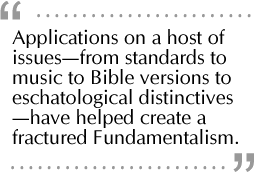Fundamentalism in the 21st Century: An Opinion
by Dr. Stephen M. Davis
Fundamentalism is an idea with competing movements that arose in a particular North American context in the battle for truth and which God has blessed in spite of the shortcomings it shares with all movements. Many of the fundamentalists I  know are godly people with a passion for truth and a commitment to the authority of the Word of God. Even many of Fundamentalism’s detractors would acknowledge that. Yet in my opinion and observation, Fundamentalism’s commitment to the authority of Scripture often attaches itself to interpretations and positions on issues to which scriptural authority cannot be legitimately attached. In no way would I suggest that Fundamentalism is monolithic. In fact, one finds great diversity due in part to the level of certainty that is accorded to the application of Scripture to issues that are far removed from the fundamentals of the faith. These applications on a host of issues—from standards to music to Bible versions to eschatological distinctives—have helped create a fractured Fundamentalism.
know are godly people with a passion for truth and a commitment to the authority of the Word of God. Even many of Fundamentalism’s detractors would acknowledge that. Yet in my opinion and observation, Fundamentalism’s commitment to the authority of Scripture often attaches itself to interpretations and positions on issues to which scriptural authority cannot be legitimately attached. In no way would I suggest that Fundamentalism is monolithic. In fact, one finds great diversity due in part to the level of certainty that is accorded to the application of Scripture to issues that are far removed from the fundamentals of the faith. These applications on a host of issues—from standards to music to Bible versions to eschatological distinctives—have helped create a fractured Fundamentalism.
In this writer’s view, Fundamentalism was an appropriate and descriptive name for a movement and its subsequent movements created in response to early twentieth century attacks on biblical authority and other fundamentals of the faith. It remains to be seen which, if any, of its present forms are viable and effective in a multicultural, pluralistic society and in a globalized world. Fundamentalism is faced with serious challenges to its existence, and the viability of movements within Fundamentalism in the twenty-first century is in question. Some have suggested re-branding or repackaging Fundamentalism to make it gentler or more authentic. Others have proposed substantive change or a cosmetic makeover with a name change.
My own journey into Fundamentalism began more than thirty years ago when I was born again into the family of God. I knew nothing of movements or divisions among Christians at that time, but that knowledge quickly changed. I did my undergraduate studies at a well-known Christian university where I received both excellent training and an initiation into the doctrine of separation in its various degrees. I remember well the public and vociferous battles between great fundamentalist leaders, all claiming the mantle of fundamentalist forebears. My graduate studies were also at a bastion of Fundamentalism but with a Baptistic flavor. From my slice of Fundamentalism, true fundamentalists were independent, Baptist, dispensational, separatist, and militant. In time, with the right (or wrong) influences, I became too independent, just short of a Baptist-brider. I was a classic dispensationalist with little room to maneuver, and I was enough of a separatist and militant to suit the combative side of my personality. My second master’s degree and doctorate were not at fundamentalist institutions, and I was warned of the danger of studying there. Certainly I was not indifferent to the interaction with godly non-fundamentalists, with whom I differed on some points, but who affirmed, articulated, and defended the fundamentals of the faith. Over a decade of overseas ministry has also influenced me as I worked in cultural contexts where Fundamentalism was not even an idea, much less a movement.
Today I confess that my thinking has changed in many areas. I am a Baptist though less independent than before, less insistent on the necessary use of the name “Baptist” (sometimes using “Baptist” causes more confusion than clarity), and open to fellowship and cooperation with Bible-believing non-Baptists. I would espouse a more progressive form of dispensationalism, yet I am more cautious and less dogmatic about how God may unfold His plans. I hold to biblical separation from unbelief and would not work in ecumenical endeavors. It is not that I have become less concerned about the purity of doctrine or less affirming on the authority of Scripture. On the contrary I have a greater concern for the truth of God’s Word to be proclaimed and applied in a word-and-deed ministry. Often we hear talk of essentials and nonessentials, majors and minors; and I realize the dangers of reductionism where everything becomes minor and nonessential. However, some doctrines are essential to the Christian faith, and some implications are essential for churches in a denominational or associational setting as part of their identity. These distinctives need not be surrendered. Some levels of fellowship and cooperation in ministry do not demand agreement in every area deemed important.
I do not think that Fundamentalism as a movement or movements is dead. I think it is mostly ignored, has made itself irrelevant, clings to anachronisms, and will persist in some forms among some believers and in some geographic regions for reasons that go beyond my intent here. It remains to be seen if movements in Fundamentalism will be viable in God’s mission to the cities and the nations of the world in our day. It does not mean that fundamentalists will not be active in world missions or domestic church planting. Indeed, many have a heart to reach souls for Christ for which we praise God. And God will continue to deign to use His people and His Word here and there around the world. For this fact we should be grateful. Although Fundamentalism has been known—and rightly so—for a heart for the lost, it most often fails in engaging culture and in discipling new converts to live the Christian life in community, in their communities, and in the Great Commission community. Christians are often taught to find sanctuary from the world by retreating into the refuge of separatism, by building walls to protect themselves from the outsiders, by creating institutions to isolate themselves from the larger dominant culture, by fighting foolish battles in the name of the truth, or by jumping on the bandwagon of conservative political candidates who share their values in an us-against-them world.
What I write is not meant to be a blanket criticism of Fundamentalism or a blanket endorsement of Evangelicalism. I do not question the legitimacy of Fundamentalism as a valid yet not exclusive expression of the Christian faith. Anyone looking for greener grass in Evangelicalism will be disappointed. What I am suggesting is that we may have entered a post-ism era where a movement will not define us and where our identity will not be limited to those who use the same labels we do. We will not escape all labels and become a-labelist. What will identify us is our faithfulness to the Word of God, our love for our brothers and sisters in Christ, even those with whom we disagree in minor areas (yes, I know that for some there are no minors), and a greater engagement in our fallen culture. Among the criteria for fellowship will not be the label for those who choose to retain one or the other. Fellowship will be sought with those who manifest family traits without masking disagreement, while engaging in constructive theological dialogue, and with the willingness to practice separation when scripturally compelled. We will not shun the opprobrium of culture due to the exclusiveness of our Christocentric message or practice political correctness in the name of unbridled tolerance. We will not be silenced in the public square and will address the moral questions that arise and challenge the biblical revelation concerning the family, issues of justice, and stewardship of God’s creation. Yet we will strive to speak the truth in love and view those outside the family of God as objects of God’s salvific intentions and first seek ministry to them rather than separation from them.
My sense of where we are heading may be completely wrong and distorted, and I lay no special claim to objectivity. For many in Fundamentalism today, especially younger men, the ideas and strengths of Fundamentalism will find expression in other movements, but the outmoded label and extra-biblical trappings will be dropped. We will always see the need for the clear preaching of the cross of Jesus Christ and a call to and the practice of biblical separation from unbelief and apostasy. These are not only fundamentalist concerns but also biblical imperatives. What will be added is an intentional engagement with the people outside the Christian culture, a greater sense of the biblical responsibility to address social evil and injustice as contrary to God’s intentions for His creation and more compassion and involvement with those who are trapped in the enslaving cycle of sin and poverty. While repudiating the deviant lifestyles of those trapped in the chains of sin, there will be less hesitation to reach out to them with the love of Jesus and the power of the gospel. Without withdrawing from the political process, there will be less politicizing of the Christian faith in pigeonholing people according to their political affiliation or seeking unanimity in electoral choices. There will be less confidence that getting the right candidate in office will restore the nation to its supposedly Christian roots.
I have—or hope to have—fundamentalist friends who, while not sharing all of my concerns and criticisms, share a bond in Christ that is stronger than our differences. But I will not allow a movement to define me and to choose my battles. The Word stands above every movement and every culture in every time and in all places. To that sacred and timeless Word and to its Author we must yield and give our allegiance.
 Dr. Stephen M. Davis is associate pastor and director of missions at Calvary Baptist Church. He holds a B.A from Bob Jones University, an M.A. in Theological Studies from Reformed Theological Seminary (Orlando, FL), an M.Div. from Calvary Baptist Theological Seminary (Lansdale, PA), and a D.Min. in Missiology from Trinity Evangelical Divinity School (Deerfield, IL). Steve has been a church planter in Philadelphia, France, and Romania. Dr. Stephen M. Davis is associate pastor and director of missions at Calvary Baptist Church. He holds a B.A from Bob Jones University, an M.A. in Theological Studies from Reformed Theological Seminary (Orlando, FL), an M.Div. from Calvary Baptist Theological Seminary (Lansdale, PA), and a D.Min. in Missiology from Trinity Evangelical Divinity School (Deerfield, IL). Steve has been a church planter in Philadelphia, France, and Romania. |
- 21 views


Discussion